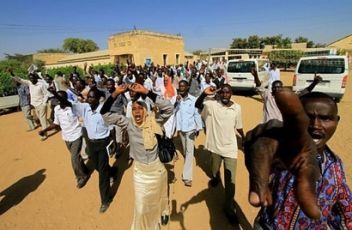Price rises spark student protests in Sudan’s central state
January 13, 2011 (KHARTOUM) – Hiked prices of sugar and petro products have spawned student protests and clashes with the police in different parts of Sudan’s central State of Al-Jazzirah, in a clear manifestation of growing public resentment over worsening economic conditions in north Sudan.

Students from Al-Jazzirah University and Madani Private College on Wednesday and Thursday held protests over government’s cuts in subsidies for Sugar and petro products, and subsequently clashed with the police who used tear gas and batons to disperse them.
The protesting students managed to reach as far as the central market in Madani town, the provincial capital, before the police was able to scatter them away. Several students sustained injured and six were arrested during the confrontation with the police.
The two-day protests spilled over to other parts of the state, including Al-Kamlin, Al-Hasahisah and Al-Hilaliah areas.
Government cuts on petro products included gasoline (from 6.5 Sudanese pounds per gallon to 8.5); diesel (from 4.5 Sudanese pounds per gallon to 6.5); cooking gas (from 12 Sudanese pounds to 13); jet fuel (from 4.5 Sudanese pounds per gallon to 6.5).
The government also raised the price of sugar by 20 Sudanese pounds per 50 kilogram (110 pounds) bag.
Sugar and petro products are vital in public life in Sudan and any increases in their prices tend to produce a domino affect on prices of other commodities and public services, whose prices have now gone steep for average Sudanese.
The cuts are part of Khartoum’s attempt to offset the economic impact of south Sudan secession and control the slump in the rates of the Sudanese pounds against the US dollar.
“A change to these sugar and fuel prices will allow the ministry of finance to save 2.06 billion Sudanese pounds,” Sudan’s finance minister Ali Mahmood said in defense of the cuts last week.
The oil-rich region of South Sudan is widely expected to emerge as an independent state as a result of an ongoing vote that was promised under a 2005’s peace deal that ended nearly two decades of civil war with the north.
Sudan produces some 500,000 barrels per day of oil, but only 100,000-110,000 bpd are from wells in the north. The economy is dependent on oil for some 45 percent of its budget and most of its foreign currency revenues.
In November Sudan temporarily devalued the Sudanese pound to match the black market, hoping to bring more foreign currency into official trade and destroy the parallel market. So far it has met with limited success with banks still unable to meet the demand for foreign currency.
Sudan has spent heavily on government and defense while increasing its debt and imports to cover a fall in local production, leading to foreign exchange shortages, rising inflation and a weakening Sudanese pound
(ST)
